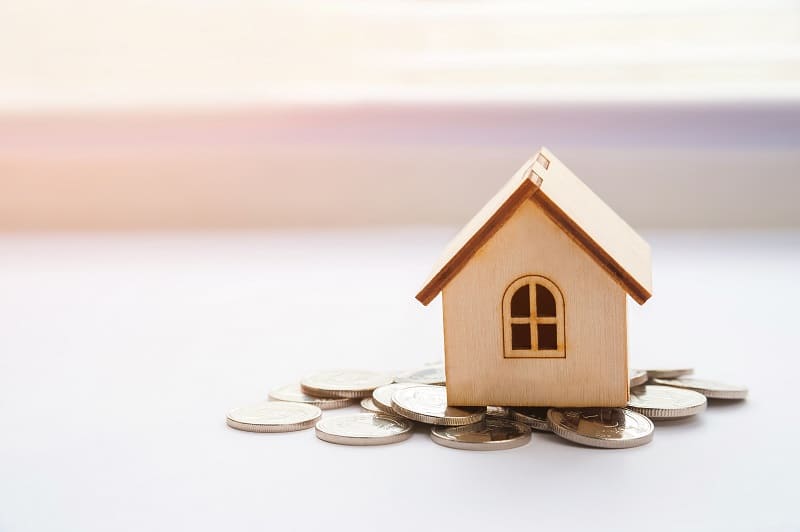Many Australians enter the property market with the expectation that property prices will rise. This means that you make a healthy amount of money, which is great – until capital gains tax comes into play.
Capital gains tax (CGT) is the contribution of the profit you’ve made to the Australian Taxation Office (ATO). Unfortunately, tax is inevitable – but there are ways to get around it in certain instances. And knowing how to qualify for an exemption from capital gains tax can save you thousands of dollars.
One way to avoid paying capital gains tax is by following the capital gains tax property 6-year rule – and here’s everything you need to know.
When Do You Pay Capital Gains Tax on an Investment Property?
A capital gain refers to making a profit when you sell a property; that is, if you sell the property at a higher price than what you bought it for. Conversely, the opposite is known as a capital loss.
Any capital gains need to be declared on your annual income tax return.
The tax-induced by capital gains must be paid and accounted for when the capital gains tax event occurs. This typically occurs when the property gets sold.
The financial year in which the capital gains tax event occurs is important to note to benefit from the base tax outcome.
If you’ve made a capital loss, the amount can be carried forward to offset any capital gains in future years. It can’t be used as a way to minimise assessable income from other sources, though.
How Can You Avoid Capital Gains Tax?
If you live in the property, it is called your principal place of residence (PPOR). Typically, the sale of a principal place of residence with a capital gain qualifies it for a main residence exemption.
For a property to be your primary place of residence, you must:
- Live (or have lived) on the property
- Have your personal belongings there
- Receive your personal postal mail to the property’s address
- Have the address recorded as your home on the electoral roll
- Receive the utilities in your name
Can You Qualify for the Main Residence Exemption With an Investment Property?
In certain instances, yes, you can claim capital gains tax exemptions for an investment property.
However, property investors must follow the three golden rules regarding the sale of investment properties when making a capital gain if they want to avoid triggering capital gains tax liabilities:
You Must Elect the Property as Your Main Residence
Upon purchasing the property, you should elect it as your principal residence.
Suppose you rent it out straight away to use as a rental property. In that case, you will be disqualified from the six-year rule of main residence exemption, and you’ll still have to pay CGT unless you later decide to nominate it as your primary residence.
Utilise the 6-Month Rule, If Necessary
If you need to move out of your property and still want to claim the main residence exemption, you are only allowed to make another property your primary place of residence for a six-month period.
To qualify, you need to meet at least one of the following requirements:
- Your property was your primary place of residence for a continuous period of at least three months during the twelve months before you sold it
- Your property wasn’t rented out to receive assessable income during the twelve months before selling
- The new property will be your new official main residence
Take Advantage of the Six Year Absence Rule
If you move out of your property that was previously your main residence, you may qualify to continue treating it as your main residence for tax purposes for up to 6 years. This is known as the “6-year rule”.
Specifically, suppose you rent out a property that was originally your main residence.
In that case, you may choose to have it remain classified as your main residence for capital gains tax purposes for up to 6 years from the date it was first rented out.
This rule allows you to rent out the property you once lived in while still qualifying for the main residence capital gains tax exemption when you eventually sell it.
As long as you sell within six years of first renting it out, you can take advantage of this tax break.
What If You’re Away From Your Principal Place of Residence More Than Once?
Each period of time that you don’t stay on your property as your principal place of residence is seen by the Australian Taxation Office as its own individual instance.
This means the capital gains tax property 6-year rule effectively resets every time you move back into your property, so you can avoid paying capital gains tax on the condition that you move back within up to six years of moving out.
As it stands, there isn’t a limit on how many times you can use these tax exemptions.
And if you move out of your primary residence for more than six years and don’t rent out the property, you can still claim the main residence exemption from capital gain tax – provided it remains your PPOR.
Example
Tracy bought her own house in 2018 in Sydney for him and his dog, Lilo.
In 2020, when COVID hit, Tracy was forced to move back in with her elderly parents for a short time to take care of them. At that stage, she had only moved out temporarily, so her Sydney property remained her principal place of residence.
Tracy’s parents appreciated the extra help around the house and fell in love with Lilo, so she decided to rent out her property on a three-month lease agreement and extend her stay. This way, the house wasn’t sitting empty, and Tracy could generate some extra money through rental income.
The tenants rented Tracy’s property from April 2020 to June 2020, and when the time concluded, her parents decided it would be best to move into a retirement village with a full-time carer. They offered their house to Tracy straight away since it would be her inheritance anyway.
So, Tracy decided to move back into her property, start packing up her personal belongings slowly and put it on the market to make a capital gain in the new year. She will still be eligible to claim the main residence exemption for the capital gains tax charged when selling the property, thanks to the six-year rule: she moved out of her property into a house that wasn’t regarded as her main residence and moved back home within a six-year period.
Key Takeaways
When you sell your home or investment property and make a profit, you will be subject to capital gain tax.
This can amount to paying tax for thousands of dollars, so many people use the six-year rule to avoid capital gains tax. The three golden rules are:
- You must use the newly bought property as your principal place of residence.
- You can only make another property your primary place of residence for a six-month period if you buy a new home before selling your old one, provided certain conditions are met.
- You can move out of your property and rent it while staying somewhere else without making the new property your primary place of residence for up to six years.
Currently, there isn’t a limit on how many times you can use the six-year rule to avoid capital gain tax.
Understanding capital gains tax and how to avoid it as tax liability isn’t easy. Contact us today to connect with a tax specialist. KNS Accountants can give you strategic advice to help you save money and reach your financial goals.
FAQ
How Much Capital Gains Tax Will I Pay on an Investment Property?
If you hold an investment property for over 12 months before selling, individuals are entitled to a 50% capital gains tax (CGT) discount. This means you only pay tax on 50% of your capital gain. The remaining 50% of the capital gain is tax-free.
Your marginal tax rate determines the final amount of CGT owed. For example, if you have a $100,000 capital gain and your marginal tax rate is 32.5%, your CGT would be $16,250 (50% of $100,000 at 32.5%).
How to Avoid Paying Capital Gains Tax on an Investment Property?
Some ways to legally minimise or avoid CGT on an investment property in Australia include:
- Moving into the property for at least 12 months before selling to qualify for the 50% discount
- Using the property as your primary residence
- Taking advantage of the CGT 6-year rule
What Is the 6-Year Rule for Capital Gains Tax Property?
The capital gains tax property six-year rule allows you to treat your investment property as your main residence for tax purposes for up to six years while you are renting it out. This means you can rent it out for six years and still qualify for the main residence capital gains tax exemption when you sell it.
It does NOT mean you can rent it out tax-free for six years. The key is that by treating it as your main residence under this rule, you can rent it out and then sell within six years while still utilising the main residence CGT exemption.
How Much Capital Gains Tax Do I Pay on $100,000?
With the 50% CGT discount, an individual would have a taxable capital gain of $50,000 on a $100,000 capital gain. If their marginal tax rate is 32.5%, the CGT payable would be 32.5% of $50,000, which equals $16,250.
Disclaimer
Please note that every effort has been made to ensure that the information provided in this guide is accurate. You should note, however, that the information is intended as a guide only, providing an overview of general information available to contractors and small businesses. This guide is not intended to be an exhaustive source of information and should not be seen to constitute legal or tax advice. You should, where necessary, seek your own advice for any legal or tax issues raised in your business affairs.
When Do You Pay Capital Gains Tax on Investment Property?
A capital gain refers to making a profit when you sell a property; that is, if you sell the property at a higher price than what you bought it for. Conversely, the opposite is known as a capital loss.
Any capital gains need to be declared on your annual income tax return.
The tax induced by capital gains must be paid and accounted for when the capital gains tax event occurs. This typically occurs when the property gets sold. The financial year the capital gains tax event occurs in is important to note to benefit from the base tax outcome.
If you’ve made a capital loss, the amount can be carried forward to offset any capital gains in future years. It can’t be used as a way to minimise assessable income from other sources, though.
How Can You Be Exempt From the Capital Gains Tax Payable?
If you live in the property, it is called your principal place of residence (PPOR). Typically the sale of a principal place of residence with a capital gain qualifies it for a main residence exemption.
For a property to be your primary place of residence, you must:
- be living in the property at the time of it being sold,
- have all your furniture and belongings stored there,
- receive your personal postal mail to the property’s address,
- have the address recorded as your home on the electoral roll, and
- receive the utilities in your name.
The capital gains tax property 6-year rule is a method to qualify a former home into an investment property as an owner-occupier so you can receive main residence exemption when you make capital gains.

How Can You Qualify For a Tax Exemption With an Investment Property?
Property investors must follow the three golden rules regarding the sale of investment properties when making a capital gain if they want to avoid triggering capital gains tax liabilities:
- Upon purchasing the property, it must immediately be used as your principal place of residence. If you rent it out straight away to use as an investment property, you will be disqualified from the six-year rule of main residence exemption and you’ll still have to pay CGT.
- If you need to move out of your property and still want to claim main residence exemption, you are only allowed to make another property your primary place of residence for a six month period. To qualify, you need to meet at least one of the following requirements:
• your property was your primary place of residence for a continuous period of at least three months during the twelve months before you sold the property,
• your property wasn’t rented out to receive assessable income during the twelve months before selling, or
• the new property will be your new official main residence. - If you move out of your property and rent it out but don’t stay in the investment property as your primary place of residence, you can still qualify for a capital gains tax exemption for up to six years under the six-year absence rule. The Australian Taxation Office states that this could be applicable if:
• you accept a new job interstate or overseas,
• you have to move in to look after a sick relative, or
• you go on an extended holiday.

What If You Are Away From Your Principal Place of Residence More Than Once?
Each period of time that you don’t stay in your property as your principal place of residence is seen by the Australian Taxation Office as its own individual instance.
This means the capital gains tax property 6-year rule effectively resets every time you move back into your property, so you can avoid paying capital gains tax on the condition that you move back within up to six years of moving out.
As it stands, there isn’t a limit on the number of times you can make use of these tax exemptions.
And, if you move out of your primary place of residence for a period of more than six years and don’t rent out the property, you can still claim main residence exemption from capital gain tax.
Example
Tracy bought her own house in 2018 in Sydney for him and his dog, Lilo. In 2020 when COVID hit, Tracy was forced to move back in with her elderly parents for a short time to take care of them. At that stage, she had only moved out temporarily, so her Sydney property remained her principal place of residence. Tracy’s parents appreciated the extra help around the house and fell in love with Lilo, so she decided to rent out her property on a three-month lease agreement and extend her stay. This way, the house wasn’t sitting empty, and Tracy could generate some extra money through rental income. The tenants rented Tracy’s property from April 2020 to June 2020, and when the time concluded, her parents decided it would be best to move into a retirement village with a full-time carer. They offered their house to Tracy straight away since it would be her inheritance anyway. So, Tracy decided to move back into her property, start packing up her personal belongings slowly and put it on the market to make a capital gain in the new year. She will still be eligible to claim the main residence exemption for the capital gains tax charged when selling the property, thanks to the six-year rule: she moved out of her property into a house that wasn’t regarded as her main residence and moved back home within a six-year period.

Key Takeaways
When you sell your home or investment property and make a profit, you will be subject to capital gain tax.
This can amount to having to pay tax for thousands of dollars, so many people use the six-year rule to avoid capital gains tax. The three golden rules are:
- you must immediately use the newly bought property as your principal place of residence,
- you can only make another property your primary place of residence for a six month period under certain circumstances that the Australian Taxation Office explains, and
- you can move out of your property and rent it while staying somewhere else without making the new property your primary place of residence, for up to six years.
Currently, there isn’t a limit on the number of times you can make use of the six-year rule to avoid capital gain tax.
Understanding capital gains tax and how to avoid it as tax liability isn’t easy. Contact us today to connect with a property tax specialist.
The property tax specialists at KNS Accountants can give you strategic advice to help you save money and reach your financial goals.
Disclaimer
Please note that every effort has been made to ensure that the information provided in this guide is accurate. You should note, however, that the information is intended as a guide only, providing an overview of general information available to contractors and small businesses. This guide is not intended to be an exhaustive source of information and should not be seen to constitute legal or tax advice. You should, where necessary, seek your own advice for any legal or tax issues raised in your business affairs.






